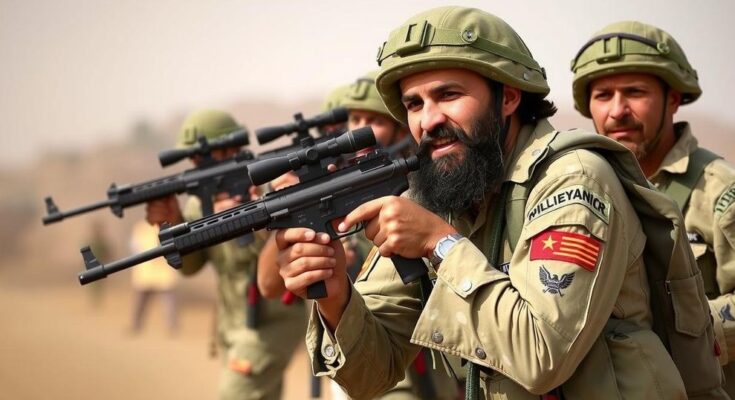Iran is enhancing its military support to the Houthis, providing advanced weapons enabling sustained attacks against Israel and global shipping. The escalation follows the weakening of Iranian proxies in the region and emphasizes the need for decisive actions against the Houthi leadership to curtail their military capabilities and influence.
Recent reports indicate that Iran is augmenting its military support for the Houthi militia in Yemen, according to Abdul Basit Al-Baher, spokesperson for Yemen’s military in Taiz. He stated that the resources supplied by Iran enable the Houthis to maintain prolonged aggression towards Israel and hostile actions against international maritime routes. The increased frequency of Houthi missile attacks against Israel is considered a direct consequence of Iran’s intensified assistance, particularly following the decline of its alliances with groups like Hamas and Hezbollah.
Al-Baher emphasized that the Houthis have acquired sophisticated weaponry, including high-level missiles and aircraft, alongside facilities for assembling drones and developing missiles utilizing Iranian expertise. Continuous smuggling of weapon components, especially drones and missiles, from Iran is reported, further reinforcing the militia’s military capabilities. He assessed that the Houthis are well-equipped to sustain their military campaigns for an extended period.
The Houthis have executed six missile attacks against Israel since Christmas, amidst countermeasures including Israeli airstrikes targeting the group’s infrastructure. Their control over significant territories in Yemen complicates military interventions. Al-Baher proposed that the elimination of the Houthi leader Abdul-Malik al-Houthi is essential for any effective counter-offensive against the militia, as his leadership is central to their operations.
A source from Israel concurred with Al-Baher’s assessment, asserting that neutralizing the Houthi leadership could lead to the regime’s collapse given its reliance on a singular leadership structure. The source indicated that an assassination attempt may be a potential response if the Houthi military campaign against Israel continues.
Israeli intelligence recognizes that the Houthi’s capability has taken them by surprise, although they doubt the sustainability of the current level of aggression due to their comparative limitations against Hezbollah. However, the dispersed nature of Houthi assets makes comprehensive targeting challenging.
Ali Alboukhaithi, a defected Houthi spokesperson, contended that despite having significant weapon stockpiles for regional engagement, the resources dedicated to assaults on Israel are limited and potentially unsustainable in the long term.
As Iran’s support for the Houthis amplifies, especially in light of shifting regional alliances, concerns regarding their influence on global stability continue to escalate. Additionally, U.S. intelligence acknowledges the need to reevaluate their strategies given the Houthi’s unexpected threat level. Mark Toth, a security expert, predicted heightened U.S. military action against the Houthis under the incoming administration, citing a commitment to counteract Iran’s influence in the region effectively.
The ongoing conflict in Yemen has seen significant international involvement, particularly from Iran, which has historically supported various proxy groups in the Middle East. The Houthis, officially known as Ansar Allah, have emerged as a powerful faction in Yemen, capitalizing on regional dynamics and external support. Their efforts have recently shifted towards aggressive posturing against Israel and global commercial shipping routes, raising alarms among neighboring nations and global powers alike. With the backdrop of decreased efficacy from Iran’s other proxies such as Hamas and Hezbollah, the Houthis have become a focal point for Iran’s strategic military investments in the region. This shift in dynamics underscores the complex interplay of local and international factors fueling the conflict in Yemen and beyond.
In summary, the Houthis’ increased military capabilities, attributed to significant Iranian support, present a heightened threat to both regional stability and global maritime security. The escalation of attacks against Israel illustrates the growing assertiveness of the Houthis, supported by sophisticated weaponry and logistical backing from Iran. As the conflict evolves, the imperative to assess and address this new threat from the Houthis will be critical for regional and international stakeholders. Effective countermeasures will likely require decisive action against the Houthi leadership to dismantle their operational command and control.
Original Source: www.telegraph.co.uk




